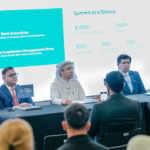Introduction
AcceleratEMEA had the privilege of partnering and attending the Dubai Fintech Summit on the 6th and 7th of May, as part of strategic media partnership with the summit. This prestigious event, held at Madinat Jumeirah, Dubai, marked its second edition, bringing together a diverse view of banks, fintech companies, and government representatives.
Overview of the Summit
The Dubai Fintech Summit is a key component of the Dubai Economic Agenda (D33), which aims to position Dubai among the top four global financial hubs by 2033. Fintech hubs worldwide are evaluated using the PEST framework, which examines Political/Legal, Economic, Social, and Technological dimensions.
The importance of the summit is represented by the increase in the number of exhibitors, doubling from 100 last year to 200 this year. The summit fosters cross-border collaboration and innovation, essential for the transformation of the global fintech sector.
This year’s Summit saw the participation of over 1,000 investors, including more than 10 top executives from some of the world’s biggest banks, managing over USD 7trn in assets under management (AUM). In addition, over 40 FinTech and blockchain unicorns, with a combined market capitalization of over USD 400bn were also present.
Arif Amiri, CEO of DIFC Authority, highlighted the rapid technological transformation in FinTech. He noted that FinTech revenues have grown six-fold globally, and cryptocurrencies’ market capitalization has exceeded USD 3 trillion. This year, FinTech is expected to secure an additional 5% of global financial service revenues. In the next two years, digital payments are projected to increase by over USD 10 trillion, and by 2030, more than 25% of banking valuations will be driven by FinTech.
Key Insights and Takeaways
Attendance and Participation: The 2nd edition of the Dubai FinTech Summit attracted over 8,000 visitors from 118 countries.
Investment Management Firms: More than 20 top firms, investing in 12,000 companies, participated.
Revolut Expansion: Nikolay Storonsky, Founder and CEO of Revolut, announced expansion plans in the MEASA region.
Dyna.AI Operations: The firm launched operations across multiple regions, with planned offices in the UAE, Saudi Arabia, and Nigeria.
Global Banks’ and Institutions’ Local Investments: Major global banks and institutions, such as Bank of America and BlackRock, have indicated their continuous investments in the region, indicating its significance as a growing hub for business and finance.
State Street Global Advisors: Yie-Hsin Hung, President and CEO, confirmed the reopening of their Dubai offices.
Bank as a Tech Company: Bank of America defined itself as a tech Company.
AI Placements in Company Hierarchies: The concept of integrating AI peers into operations is becoming a reality sooner than anticipated.
Key Topics Discussed
Risk, Regulations, and Technology Investments: One of the most compelling discussions revolved around regulation and risk, featuring insights from executives at Finastra, BlackRock, and Bank of America. Key points included the disparity in the adoption of technologies such as cloud technology among countries and the varying progress in regulatory policies. While some countries have moved to the cloud, others are still in the process of finalizing their policies. As technology and innovation advance rapidly, regulators will eventually catch up.
EMEA Head of Bank of America highlighted their experience with regulators, as an established institution they have the skills and experience to effectively deal with regulators, which is also advantageous for startups as technology and digital transformations advance quickly. Collaborating with regulators can significantly benefit both established institutions and startups.
Another discussion was about risk exposure; cybercrime now involves sophisticated AI-driven attacks that can disable even the most secure systems. Focusing on solutions like behavioral biometrics and quantum cryptography to counter these threats is rising. A great example is Astra Tech’s launch of Palm Pay through its Central Bank of the UAE licensed fintech subsidiary. Palm Pay is a contactless palm recognition service that allows customers to make payments by hovering their palm over a device, marking a first for the region. In cloud data processing, The Zero Trust model—”never trust, always verify”—is the industry standard.
Traditional banks are transforming themselves and redefining their roles in the new landscape. For example, Bank of America described itself as a tech company and emphasized that they have been using AI technologies long before AI became a very popular topic. They invested $12 billion in technology last year, including $3.8 billion on new initiatives. They have developed their technology, called Erica, and are using AI extensively.
AI Discussions: AI continues to be a highly popular topic. One panel discussion presented the idea that, in a few years, we will see new organizational charts where AI colleagues are included, reflecting their significant contribution to productivity. AI enhances customer experience, improves data analysis, increases efficiency, and ensures accuracy, fundamentally transforming the financial sector. This advancement will also enable small businesses to compete with large financial institutions, presenting a tremendous opportunity for many fintech and financial projects. AI is significantly increasing productivity, similar to the transition from the agricultural to the industrial era, where productivity increased sharply across different sectors. However, from the industrial to the tech era, productivity represented a decline. Recent AI developments are reversing this trend, once again driving productivity growth. Notable dynamics have arisen thanks to generative AI. AI has become a topic of interest and discussion for everyone, no longer belonging solely to tech enthusiasts, transforming it from a niche area into a mainstream subject.
Fintech vs Bank: The traditional narrative of disruptive innovations often brings to mind images of fierce competition between emerging technologies and established institutions. However, the emphasis at the summit was on the growing collaboration and partnership between fintech companies and traditional banks. While collaboration is the primary focus, competition still exists, particularly between bank-backed fintech solutions and independent fintech startups. This dynamic creates fertile ground for innovation, as both entities strive to enhance their offerings and meet the evolving needs of consumers.
Crypto Discussions: The summit also explored significant discussions on cryptocurrency. One of the most interesting was BlackRock’s evolving perspective on the subject. Initially, there was skepticism regarding cryptocurrencies at BlackRock, as mentioned by their CIO. They viewed crypto as more of a science topic, not directly relevant to their business operations. However, this perspective has evolved into active exploration with a strong focus on addressing cybersecurity risks.
This shift shows increased recognition and awareness of the growing importance and potential impact of cryptocurrencies in the financial sector. The CEO of 21. Co emphasized the potential of cryptocurrency, particularly its ability to facilitate programmable money while highlighting Bitcoin’s stability and its role as digital gold. He pointed out two key areas of growth: the tokenization of assets which will create blockchain tokens to store assets as digital assets and the expansion of programmable money beyond Bitcoin, enabling advanced financial applications to handle complex financial transactions automatically.
Bank of America (BOA) has established itself as a leader in financial innovation with a robust patent portfolio. As of the latest report, BOA holds an impressive total of 6,600 patents. Notably, in the last year alone, BOA secured 644 new patents, demonstrating a significant commitment to advancing technological innovation. Among the new patents obtained in the past year, 40 are specifically related to blockchain and distributed ledger technologies, as mentioned by the EMEA Head during the recent summit Bank of America’s proactive approach to securing patents and investing in blockchain technology positions it as a forward-thinking institution in the financial sector.
Acknowledging the $3.5 trillion market cap of cryptocurrencies and adopting blockchain and distributed ledger technologies for enhanced security and transparency, institutions and startups are competing to position themselves at the forefront of financial innovation.
Energy Transition and Banks: Significant debates between sustainability activists and banks in Europe and the USA highlight the pivotal role banks play in funding energy transitions and supporting the shift towards more sustainable energy solutions. Regulations vary between regions and countries; however, some countries will likely take the lead in implementing more stringent regulatory actions. When asked about their favorite trends, Jim O’Neill from Bank of America remarked that it was a very expansive question, and a lot is going on simultaneously, he chose energy transition as his focus, while the Finastra executive highlighted technological advancement as their preferred trend.
Geopolitical Risks: One of the most impressive panel discussions featured Wamda Capital Chairman, Fadi Ghandour, who addressed the topic of geopolitical risks. Ghandour shared that when he began investing in the region 40 years ago, many warned him about the potential risks and uncertain future. He emphasized that, as regional residents, they are born into these conditions, and it becomes a part of daily business life. Despite these risks and warnings, the region has continued to grow and achieve numerous successes, becoming a very important and attractive hub for business.
Networking and Collaboration: Over 300 thought leaders participated in 125 discussions across five stages, with more than 200 exhibitors. Over 50 international associations were represented, including Africa FinTech Network, Business France, FinTech Philippines Association, European Blockchain Association, Global FinTech Alliance (GFA), Hong Kong FinTech Industry Association, International Digital Economy Association, Invest Seoul, Luxembourg Institute of Financial Technology (LHOFT), Swiss Finance & Technology Association, and Women in Web3 Association.
Diversity and General Look: The financial sector remains predominantly male-dominated, which was evident at the summit. Nonetheless, there was a diverse range of dress codes, from formal business attire by bank representatives to smart casual looks by startup CEOs. For instance, BlackRock’s CIO sported a black t-shirt with a black suit. Another example is Dyna.AI’s Chairman, who joined a panel discussion in a light blue t-shirt while other panel attendees wore dark-colored jackets and suits.
Interest in the summit was exceptionally high for the panel discussion featuring international authorities and local entities such as banks, startups, and government authorities. The venue was packed, and at times, it was difficult to find a seat, with many attendees standing to watch the discussion.
Future Trends and Strategic Implications
Regulatory Adaptation: Continued evolution and adaptation of regulatory frameworks to keep pace with technological advancements.
AI Integration- Technology and Risks: Increasing integration of AI in various aspects of the financial sector, leading to improved efficiency and new capabilities while raising requirements for risk management.
Sustainability Focus: Growing emphasis on sustainable finance and investment in green technologies.
Attending the Dubai Fintech Summit was an enriching experience. The insights and discussions from the event provide a roadmap for future developments in the fintech sector. For next year’s summit, current AGI releases by OpenAI and Google AI will advance our experiences further with new technologies, defining a significant milestone in the digital age.
Author: Emine Yilmaz Butun, CPA
Emine is an experienced entrepreneur and corporate professional worked in multinational corporations listed in the Fortune 100, specializing in finance, digital transformations, and strategic management. She is the board advisor for her family business, a speaker, and the founder of AcceleratEMEA, a think tank and management consultancy for digital business transformations, and a visiting lecturer at a business school.
Share on:




